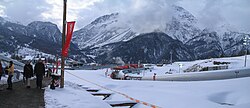Cesana
| Cesana Torinese | |
|---|---|
| Comune | |
| Comune di Cesana Torinese | |
 |
|
| Location of Cesana Torinese in Italy | |
| Coordinates: 44°57′N 6°48′E / 44.950°N 6.800°ECoordinates: 44°57′N 6°48′E / 44.950°N 6.800°E | |
| Country | Italy |
| Region | Piedmont |
| Province / Metropolitan city | Turin (TO) |
| Frazioni | Bousson, Désèrtes, Fénils, Mollierès, Solomiac, Thures, Champlas Seguin, Rhuilles, San Sicario Borgo, San Sicario Alto, Pra Claud |
| Government | |
| • Mayor | Lorenzo Colomb |
| Area | |
| • Total | 121.0 km2 (46.7 sq mi) |
| Elevation | 1,354 m (4,442 ft) |
| Population (2008) | |
| • Total | 1,055 |
| • Density | 8.7/km2 (23/sq mi) |
| Demonym(s) | Cesanesi |
| Time zone | CET (UTC+1) |
| • Summer (DST) | CEST (UTC+2) |
| Postal code | 10054 |
| Dialing code | 0122 |
| Patron saint | St. John the Baptist |
| Saint day | June 24 |
| Website | Official website |
Cesana Torinese (French Césanne) is a comune (municipality) in the Province of Turin in the Italian region Piedmont, located about 70 kilometres (43 mi) west of Turin, on the border with France.
Cesana Torinese covers 12,130 ha and is bordered by the comune of Oulx on the north, France on the south, the comunes of Sauze di Cesana and Sestriere on the east, and the comune of Claviere and France on the west.
Cesana Torinese is sited on the route of the Roman road leading from the Po Valley to Gaul. During the Dark Ages the road lost its commercial importance but retained its military significance. Cesana was controlled by the counts of Albon and dauphins of Viennois until the second half of the 14th century, when he ceded the lands and title to France.
In 1155 Frederick I, Holy Roman Emperor authorised the dauphin Guigues V of Albon to mint silver coins in Cesana - from 1281 the coins bore the dauphins' symbol of a dolphin, which was also shown in all local coats of arms. In 1343, with the dauphins' concession, the Escarton Republic was born, on lands now divided between France and Italy. Cesana thus found itself in Escarton d'Oulx until 1713, when it was ceded to the Kingdom of Savoy by the Treaty of Utrecht.
Between the 14th and 17th centuries the Cesana valley was damaged directly and indirectly by the wars of religion, mainly fought against the "Waldensian heretics" in the Valle Chisone. During the War of the Spanish Succession (1701-1714) the territory was attacked and conquered by French troops. In the 18th century Cesana's strategic importance declined until an era when new roads were constructed and the town once again benefited from commercial traffic.
...
Wikipedia

